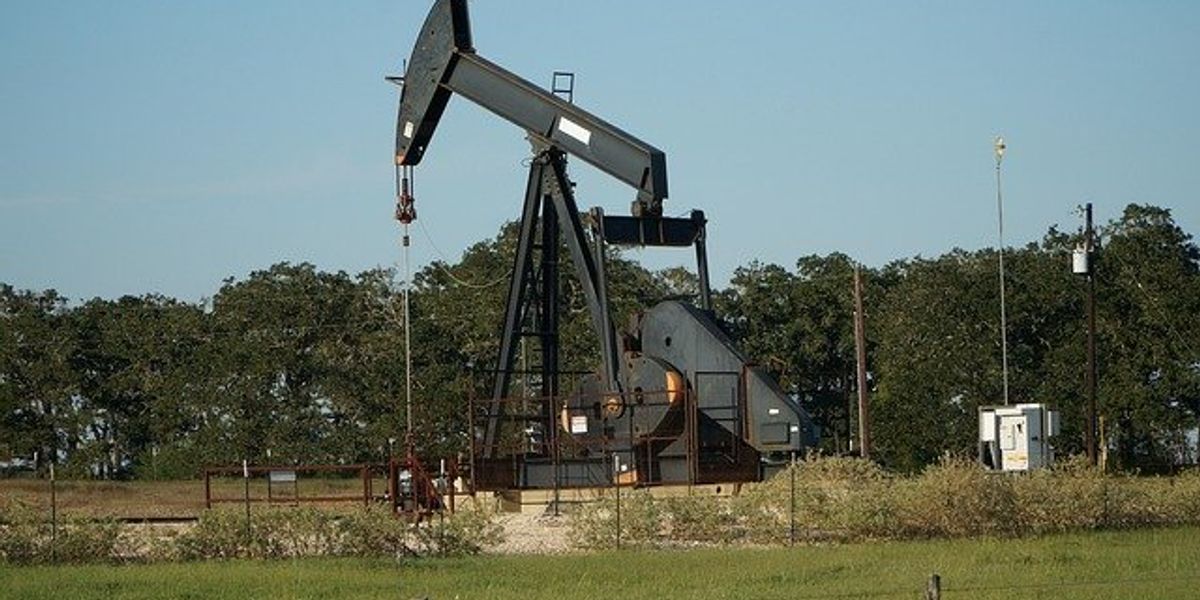
Credit: Flickr/skybeing
3h
Trump's freeze on climate spending halts projects and jobs
President Trump’s order to pause federal climate spending has delayed billions in grants, stalling home repairs, clean energy projects and factory construction across the country, including in Republican-led states.
Lisa Friedman and Brad Plumer report for The New York Times.
In short:
- A federal funding freeze has halted grants for home repairs, solar projects and pollution cleanup, affecting rural and low-income communities.
- The stoppage has left agencies, school districts and companies uncertain about ongoing projects, leading to layoffs and stalled construction.
- A federal judge ruled against blocking some funds, but agencies remain unsure when spending will resume.
Key quote:
“These are real human beings. We have one woman in her 80s who lives alone, and if she does not get her roof fixed, well, we’re going to have a senior in her late 80s who is homeless.”
— Warren Tidwell, director of the Alabama Center for Rural Organizing and Systemic Solutions
Why this matters:
The spending freeze threatens jobs, energy investments and disaster recovery in vulnerable communities. The uncertainty comes as many projects launched under the Inflation Reduction Act — former President Biden’s signature climate and energy law — have funneled billions into Republican-led districts, spurring economic activity in regions historically dependent on fossil fuels. Yet despite the clear benefits, political hesitation to challenge the Trump administration's freeze remains strong.
Related: Federal funding freeze could disrupt disaster relief and environmental programs
Keep reading...Show less
Read the Full Article on www.nytimes.com
www.nytimes.com
Senator Whitehouse puts climate change on budget committee’s agenda
For more than a decade, Senator Sheldon Whitehouse gave daily warnings about the mounting threat of climate change. Now he has a powerful new perch.
Credit: Tierra Mallorca/Unsplash
3h
Homeownership risks grow as climate disasters drive up insurance costs
The rising cost of home insurance, driven by worsening climate disasters, threatens the financial security of millions of Americans and could lead to widespread migration away from high-risk areas.
In short:
- A new study by First Street Foundation predicts nearly $1.5 trillion in U.S. housing losses over the next 30 years due to rising insurance costs linked to climate disasters.
- Home insurance premiums have increased 31% since 2019 and could rise another 29%, making homeownership less financially viable in vulnerable regions.
- The study suggests more than 55 million Americans may relocate due to climate risks in the coming decades, shifting real estate values across the country.
Key quote:
First Street’s Foundation's work “plays the role of Paul Revere, of the challenge we could face if we fail to adapt.”
— Matthew Kahn, economist at the University of Southern California
Why this matters:
Owning a home has long been a primary way for Americans to build wealth, but increasing insurance costs threaten that stability. Climate-driven migration could reshape entire communities, deepen economic inequality and make housing less affordable for future generations.
Related:
Keep reading...Show less
Read the Full Article on www.propublica.org
www.propublica.org
Credit: Gabe Raggio/Pixabay
3h
Trump’s plan to dismantle FEMA meets Republican resistance
President Donald Trump suggested shutting down the Federal Emergency Management Agency (FEMA), but Republican lawmakers, facing mounting disaster costs in their states, pushed back, arguing for reforms instead of elimination.
In short:
- Trump criticized FEMA’s disaster response and proposed either reforming or eliminating it, saying states should handle recovery efforts.
- Republican lawmakers rejected shutting FEMA down, citing the financial burden states would face and the agency’s critical role in disaster response.
- GOP officials support reviewing FEMA’s efficiency, but experts warn state-led disaster management could delay aid and increase costs.
Key quote:
“FEMA can’t go away. I think the first job of the federal government is to protect people and property.”
— Sen. John Kennedy (R-La.)
Why this matters:
As climate change fuels more frequent and severe disasters, the strain on federal and state resources is becoming increasingly evident. The Federal Emergency Management Agency, long the backbone of disaster response in the United States, has faced growing criticism over bureaucratic delays and inefficiencies in delivering aid. Some argue that eliminating FEMA would force states to take greater responsibility for disaster response, but for states heavily reliant on federal assistance — especially those with limited budgets — the absence of FEMA could leave communities dangerously vulnerable.
Read more: Trump’s order weakens disaster aid equity, risking unfair recovery outcomes
Keep reading...Show less
Read the Full Article on www.politico.com
www.politico.com
Credit: Roger Jeffreys/Pixabay
3h
UK: Labour urged to ensure fair distribution of net zero costs to keep public support
The UK’s chief climate adviser warns that failing to fairly distribute the costs of decarbonization could erode public support for net zero and urges Labour leaders Keir Starmer and Rachel Reeves to make a strong economic case for green policies.
In short:
- Emma Pinchbeck, CEO of the Climate Change Committee, an independent statutory advisor, stresses that net zero policies must be framed as economic growth opportunities rather than burdens.
- Labour’s Rachel Reeves faces criticism for prioritizing economic growth while backing projects like the expansion of Heathrow Airport, raising concerns over environmental commitments.
- The Climate Change Committee’s upcoming carbon budget will include an analysis of fairness in net zero policies, highlighting who bears the costs of transition.
Key quote:
“We model the carbon budgets against the baseline where we do nothing. And the baseline where we do nothing is worse for the economy, and worse for people, than doing something.”
— Emma Pinchbeck, CEO of the Climate Change Committee
Why this matters:
The United Kingdom's pursuit of net-zero emissions is at a crossroads, with experts warning that a lack of decisive leadership could stall progress on economic and environmental fronts. As climate policies become increasingly central to the nation's economic strategy, failing to provide clear direction risks alienating key industries, undermining public trust and eroding the political consensus needed to tackle the climate crisis. Without a strategy that is perceived as fair, policies to curb emissions could deepen societal divides, with lower-income households disproportionately burdened by rising energy prices or other associated costs.
Learn more: Labour proposes extensive overhaul to decarbonize UK transport
Keep reading...Show less
Read the Full Article on www.theguardian.com
www.theguardian.com
Credit: Flickr
4h
Shell pulls out of major New Jersey offshore wind project amid shifting market
Oil giant Shell is abandoning its investment in the Atlantic Shores offshore wind project, citing market challenges, rising competition and regulatory uncertainty under President Donald Trump’s administration.
In short:
- Shell is walking away from its stake in the Atlantic Shores wind project, which could have powered 1 million New Jersey homes, though partner EDF-RE Offshore Development says it remains committed.
- Trump’s executive order halted offshore wind lease sales, paused approvals and permits and ordered a review of existing leases, raising uncertainty for developers.
- Shell is writing off nearly $1 billion in investment as offshore wind remains costly compared to other clean energy options.
Key quote:
“The potential uncertainty that the executive order has brought to the market, it cannot be ignored.”
— Coco Zhang, vice president for environmental, social and governance research at ING
Why this matters:
Offshore wind is seen as critical in reducing carbon emissions, especially along densely populated coastlines where energy demand is high. Shell’s exit signals growing industry hesitation, which could slow the transition to clean energy. This comes as developers grapple with inflation, surging material costs and increasing difficulty securing long-term agreements to sell electricity at competitive prices. These economic headwinds coincide with uncertainties in federal and state policies, leaving many to question the industry's ability to grow at the pace needed to meet ambitious clean energy goals.
Read more:
Keep reading...Show less
Read the Full Article on apnews.com
apnews.com
Credit: Layne Harris/Unsplash
4h
The Department of Energy’s ties to the plastics industry raise conflict concerns
The U.S. Department of Energy’s partnership with a major plastics lobbying group has fueled concerns that the agency is prioritizing industry-backed chemical recycling over broader efforts to reduce plastic production.
In short:
- In 2020, the Department of Energy (DOE) signed a five-year agreement with the American Chemistry Council to collaborate on plastics recycling, including controversial chemical recycling methods.
- Critics argue the partnership has led to industry-influenced research and funding, with little transparency about decision-making or public input.
- Despite doubts about chemical recycling’s feasibility, the DOE has invested millions in research, aligning with the petrochemical industry’s push to justify continued plastic production.
Key quote:
“There’s no transparency on how DOE is developing their policies around plastic waste. They seem very much in line with the industry agenda that's clearly formalized in the memorandum of understanding.”
— Daniel Rosenberg, director of federal toxics policy at the Natural Resources Defense Council
Why this matters:
Chemical recycling has yet to prove viable at scale, but industry-backed studies promote it as a solution to plastic pollution. The DOE’s support for these efforts may divert attention from more effective waste reduction strategies. A lack of transparency raises questions about whether public funds are being used in the public’s best interest or to serve corporate agendas.
Read more from EHN:
Keep reading...Show less
Read the Full Article on grist.org
grist.org
4h
Living near oil and gas wells linked to higher COVID-19 death rates
Californians who lived near high-producing oil and gas wells were more likely to die from COVID-19 in the early months of the pandemic, a new study finds.
In short:
- Researchers analyzed COVID-19 cases and mortality in California in 2020 and found higher death rates among people living near the most active oil and gas wells.
- Black, Latino and low-income communities, already disproportionately exposed to pollution from drilling, faced the greatest risks.
- Long-term exposure to pollutants from oil and gas operations may have weakened residents' immune and respiratory systems, increasing their vulnerability to the virus.
Key quote:
“The results of this study are, unfortunately, not surprising. We have consistently seen that people living in communities with higher levels of pollution are at increased risk of COVID infection and mortality.”
— Joan Casey, environmental epidemiologist, University of Washington
Why this matters:
The connection between pollution from oil and gas wells and severe health outcomes has been well-documented, but the COVID-19 pandemic has cast a harsh spotlight on the vulnerabilities it exacerbates. Research increasingly shows that air pollutants emitted by fossil fuel extraction — particularly fine particulate matter and volatile organic compounds — contribute to respiratory and cardiovascular diseases. These underlying conditions raise the risk of severe COVID-19 outcomes and point to broader, systemic health inequities tied to environmental degradation.
Keep reading...Show less
Read the Full Article on insideclimatenews.org
insideclimatenews.org
From our Newsroom
New evidence links heavy metal pollution with wildfire retardants
“The chemical black box” that blankets wildfire-impacted areas is increasingly under scrutiny.
Op-ed: Why funding for the environmental justice movement must be anti-racist
We must prioritize minority-serving institutions, BIPOC-led organizations and researchers to lead environmental justice efforts.
Biden finalizes long-awaited hydrogen tax credits ahead of Trump presidency
Responses to the new rules have been mixed, and environmental advocates worry that Trump could undermine them.
Op-ed: Toxic prisons teach us that environmental justice needs abolition
Prisons, jails and detention centers are placed in locations where environmental hazards such as toxic landfills, floods and extreme heat are the norm.
LISTEN: Reflections on the first five years of the Agents of Change program
The leadership team talks about what they’ve learned — and what lies ahead.
Study shows $1 billion in lost tax revenue in Houston area from industry tax breaks
Top polluters are benefiting the most from tax breaks.














